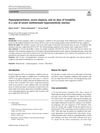 6 citations,
May 2021 in “Stem Cell Reviews and Reports”
6 citations,
May 2021 in “Stem Cell Reviews and Reports” Newly found stem cells in horse hooves show promise for treating a hoof disease called laminitis.
 January 2023 in “Brazilian Journals Editora eBooks”
January 2023 in “Brazilian Journals Editora eBooks” Psychiatrists are crucial in pain management teams because they help treat severe pain and related mental health issues.
 489 citations,
November 2021 in “Signal Transduction and Targeted Therapy”
489 citations,
November 2021 in “Signal Transduction and Targeted Therapy” The JAK/STAT pathway is important in cell processes and disease, and JAK inhibitors are promising for treating related conditions.
 5 citations,
January 2021 in “Daru”
5 citations,
January 2021 in “Daru” A woman had severe reactions to methotrexate, including skin issues and organ problems, but improved after 38 days in the hospital.

The conference emphasized innovative solutions for global challenges, including disaster architecture, education, health, and economic impacts.
 September 2023 in “International journal of medicine”
September 2023 in “International journal of medicine” AI is revolutionizing healthcare by improving diagnosis, treatment, and monitoring, but still needs close supervision.
 November 2024 in “Journal of Family Medicine and Primary Care”
November 2024 in “Journal of Family Medicine and Primary Care” 5 alpha reductase inhibitors can cause sexual, cognitive, and muscle side effects, and may slightly increase aggressive cancer risk.
7 citations,
April 2021 in “Journal of Bodywork and Movement Therapies” Recognizing and managing central sensitization and stress is crucial for treating chronic pain.
 February 2024 in “Endocrinology and Disorders”
February 2024 in “Endocrinology and Disorders” Balanced hormones are crucial for women's health, and can be managed with lifestyle changes or hormone therapy if needed.
9 citations,
May 2022 in “Frontiers in Cellular Neuroscience” Mesenchymal stromal cell therapies show promise for treating various diseases but need more research and standardization.
 39 citations,
June 2020 in “Dermatologic Therapy”
39 citations,
June 2020 in “Dermatologic Therapy” The COVID-19 pandemic led to an increase in untreated hair diseases and showed the importance of teledermatology.
 December 2022 in “International Journal of Biomedicine”
December 2022 in “International Journal of Biomedicine” Androgens may worsen COVID-19 and hair loss could indicate the disease's severity.
 58 citations,
December 2020 in “Mayo Clinic Proceedings”
58 citations,
December 2020 in “Mayo Clinic Proceedings” The conclusion is that individual differences in COVID-19 severity are influenced by factors like age, sex, race, and genetics, which are important for personalized medicine.
 27 citations,
November 2020 in “International Journal of Dermatology”
27 citations,
November 2020 in “International Journal of Dermatology” COVID-19 can cause skin issues like chilblains and rashes, which may help in early detection, especially in patients without other symptoms.
 17 citations,
May 2021 in “Journal of Assisted Reproduction and Genetics”
17 citations,
May 2021 in “Journal of Assisted Reproduction and Genetics” COVID-19 may harm male fertility and damage the reproductive system.
 9 citations,
March 2021 in “Hormones”
9 citations,
March 2021 in “Hormones” COVID-19 may affect male fertility and women might have better outcomes due to hormonal and immune differences.
 2 citations,
September 2022 in “Scholarly journal of otolaryngology”
2 citations,
September 2022 in “Scholarly journal of otolaryngology” Epipharyngeal Abrasive Therapy helps reduce symptoms in Long COVID patients with chronic epipharyngitis.
 1 citations,
January 2023 in “IEEE access”
1 citations,
January 2023 in “IEEE access” Deep learning helps detect skin conditions and is advancing dermatology diagnosis and treatment.
 January 2023 in “Journal of men's health”
January 2023 in “Journal of men's health” Higher dihydrotestosterone may be linked to more inflammation in COVID-19 patients with low testosterone.
 125 citations,
August 2020 in “Frontiers in Immunology”
125 citations,
August 2020 in “Frontiers in Immunology” Men generally have more severe COVID-19 cases and higher death rates than women due to biological differences.
 71 citations,
April 2020 in “Journal of Cosmetic Dermatology”
71 citations,
April 2020 in “Journal of Cosmetic Dermatology” Genetic differences may affect COVID-19 deaths; anti-androgens could be potential treatment.
 21 citations,
February 2021 in “BMJ case reports”
21 citations,
February 2021 in “BMJ case reports” Anabolic steroid users may face higher risk of severe COVID-19.
 March 2024 in “Sudan Journal of Medical Sciences”
March 2024 in “Sudan Journal of Medical Sciences” Many doctors lack knowledge about COVID-19 skin symptoms and need better education and guidelines.
 49 citations,
May 2020 in “Frontiers in Public Health”
49 citations,
May 2020 in “Frontiers in Public Health” Insulin resistance linked to obesity may increase COVID-19 severity.
 January 2020 in “arXiv (Cornell University)”
January 2020 in “arXiv (Cornell University)” Some existing drugs and natural products might work against COVID-19 by targeting the virus's main protease.
 70 citations,
July 2020 in “Pharmacological Reports”
70 citations,
July 2020 in “Pharmacological Reports” Cepharanthine, a Japanese hair loss drug, shows promise as a COVID-19 treatment but needs more testing.
 20 citations,
September 2020 in “Journal of Translational Medicine”
20 citations,
September 2020 in “Journal of Translational Medicine” Mesenchymal stromal cells may help treat severe COVID-19, but more research is needed to confirm their effectiveness.
 15 citations,
December 2020 in “Pharmacology Research & Perspectives”
15 citations,
December 2020 in “Pharmacology Research & Perspectives” Blocking enzymes that help the virus enter cells could be a promising way to treat COVID-19.
 January 2024 in “Frontiers for young minds”
January 2024 in “Frontiers for young minds” Alopecia is a condition causing hair loss that can impact looks and mental health.
 April 2021 in “Sohag Medical Journal”
April 2021 in “Sohag Medical Journal” Alopecia areata is an autoimmune condition causing hair loss, linked to genetic factors and immune system issues, with no cure yet.



























